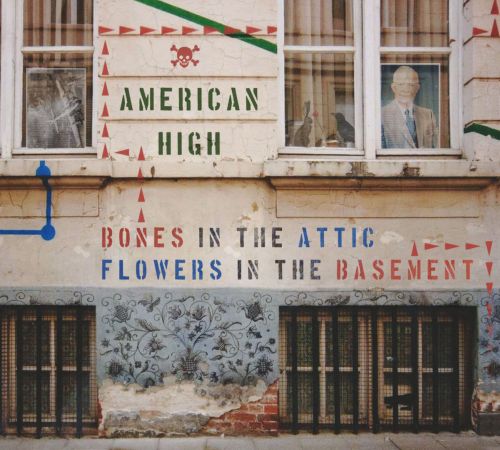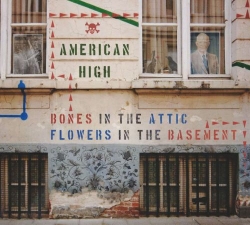Sacramento, California-based alternative rock ‘n’ roll foursome American High plies a laid-back, ‘60s-era and punk-influenced acoustic rock style that fits into the casual, sunshine-filled West Coast day of hangin’ out at Venice Beach. The incisive lyrics, however, are another story, and focus on lost love and the damage of war and suicide, but at times also concentrate on the chance that things can get better.
The members of American High write lyrics from personal experience and their observations of the social and political aspects of the world. Love, of course, is a main theme, but so is a prominent anti-war viewpoint, which is so important in today’s destructive political climate (at least, for the Western hemisphere, in the US and UK).
American High released its debut album, Bones in the Attic, Flowers in the Basement, this past March. Its members go by the acronyms E.S. (lead guitar, and one would assume, vocals), D.T. (rhythm guitar), F.M. (bass), and T.M. (drums) and the songs focus on the direct lyrics and nasally, but nicely harmonizing vocals.
The first two songs, “Fairfield, CA” and “Moon”, roll by on a mix of folk and rock with strummed acoustic guitar, subtle low-end bass, and a prominent drum beat, offering a somewhat subdued intro to the LP. “Pretty Baby”, which is fattened up with rounder horn pulls, kicks it up a notch.
“Sister, Don’t Believe” features some sweet Beach Boys-steeped harmonies that buoy the tune, and on “September”, the singer goes for a hushed, lighter vocal approach that is warmer and more welcoming.
“Sensei” is an upbeat, ‘sha-la-la-la’ filled piece of joy filled with briskly strummed acoustic guitar, running bass line, a jangly tambourine percussion, dynamic drum beat, and vinegary, imploring vocals.
The album takes a darker turn, as least via the lyrics on the reflective folk ballad “1.17.61.” The band refers to this song on its Facebook page after the horrific suicide bombing in Manchester and how everything that happened has to do with the purpose of their album – to shine a light on the cost of hatred, ignorance, and war and violence in general. The singer laments that “Pain is the deepest part of you / There is no cure / You’ll never be immune.”
Tension-reliever, at least sonically, “Bunny”, takes place after a visit at the zoo, and lifts the album back up again with shaken percussion, light guitar strum, a kinetic beat, and plaintive main vocals that are accompanied by deeper backing vocals, making for a pleasing vocal contrast. There’s also the surprise addition what sounds like some grinding electric guitar. And an amusing run-on chorus with the repetitive churn of the word “bunny”. And at the very end, the singer wishes, “If I could I’d set ‘em all free.”, tailing off with another sonic surprise – a mellow reggae beat…
“Test Pilot” is a vivid and quick-moving rocker that employs full-on electric guitar. The tune is nihilistic, at least lyrics-wise, as the singer exclaims “There’s nowhere I feel I belong / so don’t watch me leavin’…” and “I wanna die / in a blue sky.” Is he taking on the persona of a suicide bomber? Or is this a general confession of someone who is in the throes of an insidious disease called depression?
The last couple of tracks are also downers, or at least thought-provokers, with the singer on the folky rambler “I Can’t Change” taking on the perspective of a shell-shocked solider. The song is immured in bleak, but realistic lyrics about the patriot who fought for his/her country and is still trapped in that fighting mentality. (S)he admits, “…the thought occurs / I might not make it home / Now the real world seems so strange.”
Once back home, the soldier feels “lost and cursed” with “nightmares [that] get worse”, questioning point blank, “…the battles rage on in my brain / Am I still sane?” and revealing “I can’t change – anymore.” It’s a harsh reminder of the human toll of war.
“Berty’s Never Gone” is an instrumentally upbeat album-ender, but it keeps the lyrics stark with the singer proclaiming, “Every day livin’ like the hope’s all gone” and referencing “Bullies with guns…” amid sharp electric and acoustic guitar, shimmering cymbals, chugging bass line, and pushing drum beat.
Yet through the dire, and real, mire of war and violence, and the trials of life, the human race keeps on going, and the insightful lyrics, mostly cheery sonics, and engaging vocal harmonies of American High aim to help in understanding and tackling life’s challenges.


